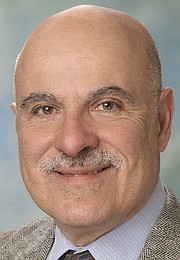County hesitant in helping pay for scientific study of Lake Cd’A
Although Gov. Brad Little and the state of Idaho decided to move forward with a scientific study of Lake Coeur d’Alene, the Kootenai County commissioners aren’t sure if they want the county to help pay for it.
On Monday, Commissioner Chris Fillios proposed reallocating some of the county’s fund balance to help pay for a study of Lake Coeur d’Alene by the National Academy of Sciences. The study, which will begin Oct. 1, is to test the health of the lake.
Lake Coeur d’Alene received a century’s worth of dangerous metals from Silver Valley mining, where tailings traveled down the south fork of the Coeur d’Alene River and deposited an estimated 75 million tons of lead, mercury, arsenic and other toxins in the lake bed.
The federal Environmental Protection Agency has long targeted the lake as a cleanup project, proposing it qualified as a Superfund site. State, federal and local interests worked together to keep it off the Superfund list, but now, parties agree that a scientific look at the health of the lake is warranted.
Earlier this year, Gov. Little decided to go ahead with the study, which Fillios believes is an attempt to reconcile the differences between the Idaho Department of Environmental Quality, the U.S. Environmental Protection Agency, and The Coeur d’Alene Tribe.
According to Fillios, the first quote for the study was projected at around $985,000 and will take about two years. Since then it decreased to about $775,000. North Idaho Field Director Jake Garringer said the governor’s office welcomes the county’s participation.
“We have approximately $5 million allocated to our fund balance for our new construction,” Fillios said. “I would like to take $200,000 of that for the study.”
In the meeting, Fillios said there could be a range of options available from the study.
“It is possible a recommendation could be made that is unaffordable and if that’s the case, then some other fallback position would have to be taken,” Fillios said. “But, I think it’s time that the county fess up.”
Commissioners Bill Brooks and Leslie Duncan expressed opposition to the allocation.
While Brooks is concerned for the overall health of the lake, he said it would be hard to move forward without the support of all stakeholders — namely The Coeur d’Alene Tribe.
“I don’t mind working with the Tribe, but I understand they have gotten up and walked away from the table,” Brooks said. “I find it very difficult to negotiate with, work with, or cooperate with anybody who has got up and walked out of the room.”
In past years, The Coeur d’Alene Tribe has invested in independent studies of the lake. From these studies, the Tribe has expressed concern for the lake, according to Fillios. Their withdrawal from the new study is due to their perception of inaction by the county, he said.
Duncan agreed that there is an apparent need for the scientific study. However, she said she will most likely not be in favor of the allocation. With Lake Coeur d’Alene being one of many bodies of water in Kootenai County, Duncan said she would have to see how much the other stakeholders are willing to take part in the study.
“I just have a concern with taking money from Bayview, Athol, and some of the northern lakes to do a study for Coeur d’Alene Lake,” Duncan said. “Yes it has a lot to do with Kootenai County, but there are a bunch of other lakes here too that are not getting this kind of attention.”
With or without Kootenai County’s participation, the state of Idaho has committed to proceeding with the study. The commissioners will revisit funding the project in next week’s business meeting.



